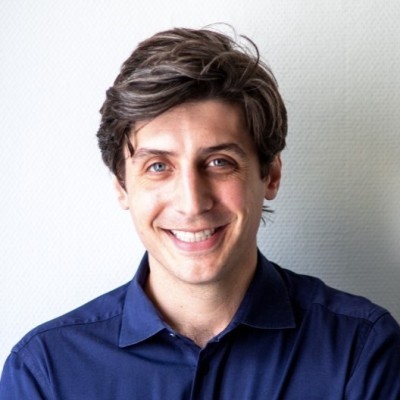
A Q&A with Nicolas Baranowski, CEO and Co-Founder of Frame
Frame is an AI-enhanced collaboration software with a mission to provide a framework for focus. Project managers utilise Frame as a unified platform to streamline task assignments, centralise communication, and monitor project progress in real-time, ensuring teams stay synchronised and projects remain on track. Remote teams use Frame to stay connected and organised, simplifying collaboration across all their tools in one unified space.
If you could go back i n time, what one piece of advice would you give your pre-startup self?
n time, what one piece of advice would you give your pre-startup self?
Pre-startup, you’re generally hesitant to launch. Sometimes, you have a day job, sometimes you don’t have the funding, and sometimes you want to optimise your risk/reward curve. I advise leaving a fixed amount of time for analysis and then launching 200% by being all-in. Getting a startup off the ground is a full-time exercise.
Also, as you’re getting started, keep the team very small. You’re better off working with 1-2 FT engineers than 10 PT mildly motivated ones. What you want is skin in the game, motivation, impact, and speed.
What is one failure you experienced during your startup journey, and what did you learn from it?
Always partner with AAA players - you can always figure things out with a great team. Changing the market, pivoting, improving the product, finding a new investor - you’ll find solutions. However, changing someone from average to great can take a decade, if it is even possible.
In some of my previous ventures, the idea was good, the ‘why now’ was good, and the product was good, but the early founding team wasn’t. I like the quote of Kevin Systrom on the ‘20VC’ podcast. His test at Instagram was: ‘When we were hiring, we were asking ourselves: do you feel like this person could, three years from now, start a great company or be the CTO of a large business, and if the answer was no, what are they doing here?”
What specific market gap or customer pain point inspired your startup's inception?
As the B2B SaaS market has grown 10x over the ten last years, we observed that the digital work environment was becoming increasingly fragmented. The alternative for a founder to build a ‘General OS’ for his team was to either buy 10 disconnected and costly tools (e.g., Miro, Todoist, Evernote, Lattice, etc) or ‘rebuild’ all of these tools on Notion. Instead, we decided to build a ‘pre-built Notion’ Frame, offering all of the essential tools a team needs to collaborate at a fraction of the cost and with a delightful and unified design.
Did you make any assumptions about your market that turned out to be incorrect? How did you pivot?
At first, we disregarded the importance of building data import tools that would allow our users to easily import from a Trello, a JIRA, into our suite.
One aspect was the budget constraints to build the core product; the other aspect was the thinking that by creating a great software experience, users would organically create content and switch to your tool.
Today, we understand that data import tools are a ‘must’, and we are currently building them.
How did you approach creating an authentic company culture, and what unique aspects of your culture do you think have contributed to your success?
Frame was founded post-bubble. While some companies managed to raise tens of millions a few months prior, we were founded in Feb 2022 and had to be resourceful from day one. It created a culture ‘à la Amazon’ where a ‘Dollar is a Dollar’ and impact matters. I think having limited resources from day one can be very healthy for the team as it trains on focus, creativity, and resourcefulness.
What crucial skill do you wish you had developed before starting your business?
Always talk to your customer. As a product-obsessed CEO, you might sometimes be very confident in knowing what to build. However, any minutes I’ve spent talking to my customers were well-invested, brought many insights, and cannot be replaced by any other process or automation. Stay close to your customers, from pre-startup to IPO.
As the company grew and you've had to bring on more help or immerse yourself deeper into certain parts of the business, how has your role as CEO evolved? What advice do you have for other founders facing a similar situation?
Every CEO will have a peak strength in ‘product’, ‘growth’, ‘fundraising’ etc. My advice for early-stage startups is that, instead of delegating and ‘buying the skill’ early on by hiring an often expensive ‘head of’ in the topic you master least. Go out there and figure it out by yourself first (advice given by Crane Ventures). Build the v1.0 of Product, Growth, and Operations yourself first. You'll develop empathy, your exec won't start from zero, and you'll be better positioned to appreciate their performance.
What missteps did you make in the early days that you wish you’d avoided?
Initially, we were a part-time team. Optimising for speed, I scaled that part-time team quite fast. You can hire well for ‘skills’, but you must also hire well for ‘mindset’ and ‘motivation.’ While that part-time was skilful, I ended up with a team where 30% were not 200% in (basically riding along and ‘taking the temperature’ of the startup, so to speak). I had to scale back the team to a part-time, fully motivated team. Take your time to grow your core team.
Looking back, what aspects of your journey do you feel you approached in the right way?
We never compromised on the quality of our design. From day one, whether at the brand level (we rebranded from ‘Dockee’ to ‘Frame’) or product design level, I knew that Frame would be a ‘design-play’ (and so would Notion, Linear, Arc Browser, etc.). We have an eye for design and never compromise on the quality (and cost) of the designers we team with.
How do you balance the tension between growth and profitability?
While the current fundraising market is tense and VCs are more sensitive to hard metrics, a SaaS venture like Frame is first about growth and second about profitability, especially at our stage (Pre-Seed/Seed). While being conscious about cost optimisation, we will continue to grow accordingly.

